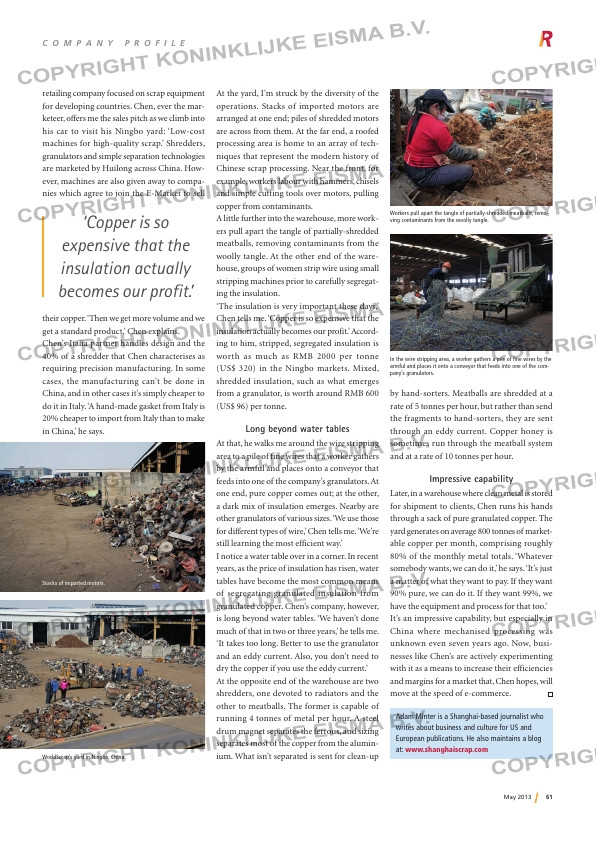Page 61 from: May 2013

61May 2013
retailing company focused on scrap equipment
for developing countries. Chen, ever the mar-
keteer, offers me the sales pitch as we climb into
his car to visit his Ningbo yard: ‘Low-cost
machines for high-quality scrap.’ Shredders,
granulators and simple separation technologies
are marketed by Huilong across China. How-
ever, machines are also given away to compa-
nies which agree to join the E-Market to sell
their copper. ‘Then we get more volume and we
get a standard product,’ Chen explains.
Chen’s Italia partner handles design and the
40% of a shredder that Chen characterises as
requiring precision manufacturing. In some
cases, the manufacturing can’t be done in
China, and in other cases it’s simply cheaper to
do it in Italy. ‘A hand-made gasket from Italy is
20% cheaper to import from Italy than to make
in China,’ he says.
At the yard, I’m struck by the diversity of the
operations. Stacks of imported motors are
arranged at one end; piles of shredded motors
are across from them. At the far end, a roofed
processing area is home to an array of tech-
niques that represent the modern history of
Chinese scrap processing. Near the front, for
example, workers labour with hammers, chisels
and simple cutting tools over motors, pulling
copper from contaminants.
A little further into the warehouse, more work-
ers pull apart the tangle of partially-shredded
meatballs, removing contaminants from the
woolly tangle. At the other end of the ware-
house, groups of women strip wire using small
stripping machines prior to carefully segregat-
ing the insulation.
‘The insulation is very important these days,’
Chen tells me. ‘Copper is so expensive that the
insulation actually becomes our profit.’ Accord-
ing to him, stripped, segregated insulation is
worth as much as RMB 2000 per tonne
(US$ 320) in the Ningbo markets. Mixed,
shredded insulation, such as what emerges
from a granulator, is worth around RMB 600
(US$ 96) per tonne.
Long beyond water tables
At that, he walks me around the wire stripping
area to a pile of fine wires that a worker gathers
by the armful and places onto a conveyor that
feeds into one of the company’s granulators. At
one end, pure copper comes out; at the other,
a dark mix of insulation emerges. Nearby are
other granulators of various sizes. ‘We use those
for different types of wire,’ Chen tells me. ‘We’re
still learning the most efficient way.’
I notice a water table over in a corner. In recent
years, as the price of insulation has risen, water
tables have become the most common means
of segregating granulated insulation from
granulated copper. Chen’s company, however,
is long beyond water tables. ‘We haven’t done
much of that in two or three years,’ he tells me.
‘It takes too long. Better to use the granulator
and an eddy current. Also, you don’t need to
dry the copper if you use the eddy current.’
At the opposite end of the warehouse are two
shredders, one devoted to radiators and the
other to meatballs. The former is capable of
running 4 tonnes of metal per hour. A steel
drum magnet separates the ferrous, and sizing
separates most of the copper from the alumin-
ium. What isn’t separated is sent for clean-up
C o m p a n y p r o f i l e
Adam Minter is a Shanghai-based journalist who
writes about business and culture for US and
European publications. He also maintains a blog
at: www.shanghaiscrap.com
In the wire stripping area, a worker gathers a pile of fine wires by the
armful and places it onto a conveyor that feeds into one of the com-
pany’s granulators.
Workers pull apart the tangle of partially-shredded meatballs, remo-
ving contaminants from the woolly tangle.
WorldScrap’s yard in Ningbo, China.
by hand-sorters. Meatballs are shredded at a
rate of 5 tonnes per hour, but rather than send
the fragments to hand-sorters, they are sent
through an eddy current. Copper honey is
sometimes run through the meatball system
and at a rate of 10 tonnes per hour.
Impressive capability
Later, in a warehouse where clean metal is stored
for shipment to clients, Chen runs his hands
through a sack of pure granulated copper. The
yard generates on average 800 tonnes of market-
able copper per month, comprising roughly
80% of the monthly metal totals. ‘Whatever
somebody wants, we can do it,’ he says. ‘It’s just
a matter of what they want to pay. If they want
90% pure, we can do it. If they want 99%, we
have the equipment and process for that too.’
It’s an impressive capability, but especially in
China where mechanised processing was
unknown even seven years ago. Now, busi-
nesses like Chen’s are actively experimenting
with it as a means to increase their efficiencies
and margins for a market that, Chen hopes, will
move at the speed of e-commerce.
‘Copper is so
expensive that the
insulation actually
becomes our profit.’
Stacks of imported motors.
RI-4_CompProfile.indd 61 03-05-13 14:20



